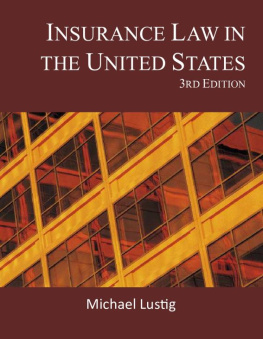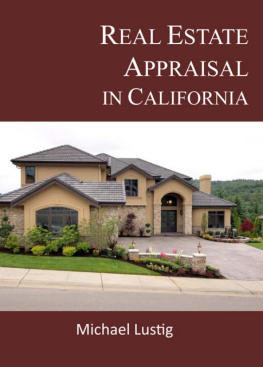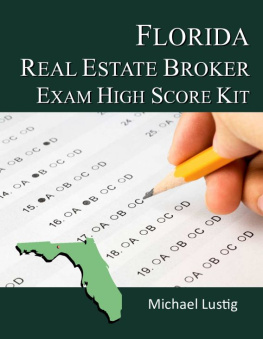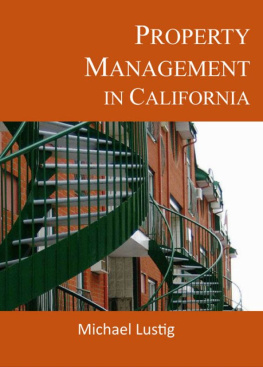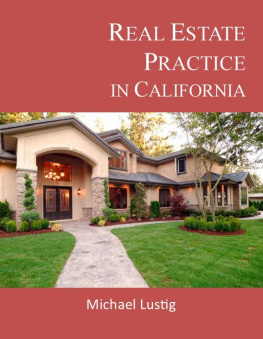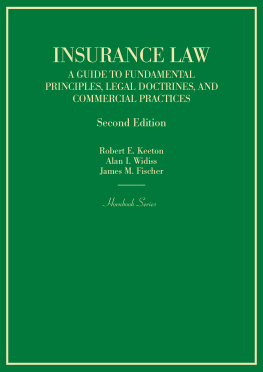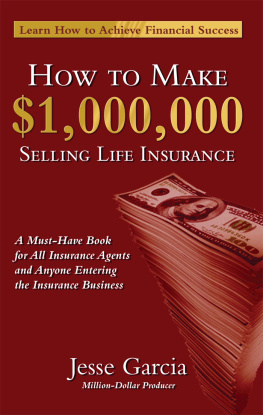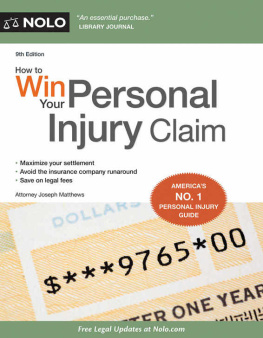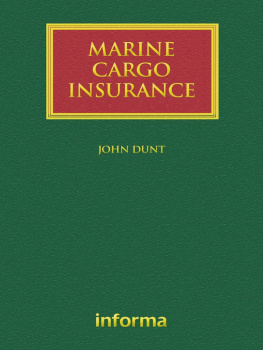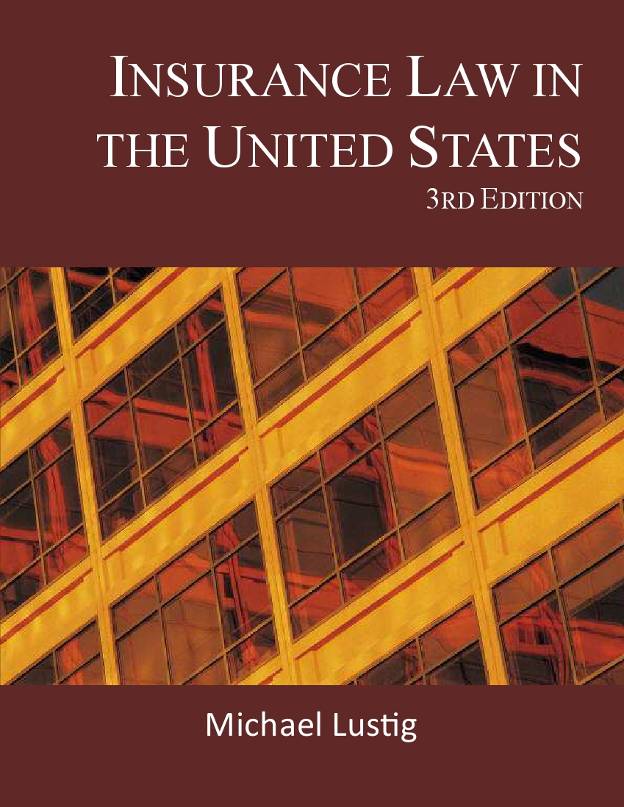
Smashwords Edition
INSURANCE LAW IN THE UNITEDSTATES
3rd Edition
CAL-STATE EXAMS
5059 Newport Avenue, #209
San Diego, CA 92107
Telephone: (619) 222-2425
Copyright 2010-1991 REAL ESTATE LICENSESERVICES, INC. Copyright registered. All rights reserved. No partof this material may be reprinted, reproduced, transmitted, storedin a retrieval system, placed in a computer or on the Internet, orotherwise utilized, in any form or by any means electronic ormechanical, including photocopying or recording, now existing orhereinafter invented, nor may any part of this course be used forteaching without permission from the copyright holder. CAL-STATEEXAMS is a division of REAL ESTATE LICENSE SERVICES, INC., holderof the registered copyright.
Notice
CAL-STATE Exams has not authorized anyone tocopy any part of this textbook, including the distributors,training schools, and insurance companies it has authorized to useor sell this textbook.
If you become aware of anyone photocopying orotherwise duplicating any part of this textbook, please notify ourhome office by mail or call collect. All such notifications will beheld in strict confidence.
TABLE OF CONTENTS
INSURANCE LAW IN THE UNITEDSTATES
DEFINITION OF TERMS USED IN THISTEXTBOOK
es top pel, e stop_ el n. [O.Fr.estoupail, stopple, stopper.] Law, a bar or impediment preventingone from asserting a fact or claim, arising from a previous action,or a failure to act, by which one has admitted, implied, orestablished the contrary.
im pute, im put_, v.t.. imputed, imputing.[O.Fr. Fr. imputer,
ul tra vi res, ul__tra vi_ rez, a., adv.Law, beyond or exceeding the legal authority or power, as of somecorporation.
waiv er, wa_ver, n. [A.Fr. weyver, mi., usedas noun.] Law. An intentional relinquishment of a known right,interest, or advantage; an express or written statement of suchrelinquishment.
LESSON ONE: STATUS AND REGULATIONOF AGENTS AND ADJUSTERS
STATUTORY REGULATION OFAGENTS
The insurance business is affected with apublic interest and is subject to control by legislation requiringinsurance agents to be licensed and regulated. This right ofcontrol arises under the general police powers of the state, andlaws passed pursuant thereto apply to all agents of insurancecompanies writing policies within the state. Agents of foreigncompanies doing business within the state may be required to givebond for an annual accounting, and payment of a certain percentageof the premiums. Likewise, a statute may validly authorize theInsurance Commissioner to regulate bail bondsmen.
Statutory regulations have been considered toapply both to foreign associations and mutual companies. Thus, aforeign mutual insurance company may be required to publish astatement of its affairs in a newspaper, published in the countywhere its agent transacts the business of his agency, before he canmake a valid contract of insurance. But if the statute is expresslylimited to certain types of companies, such as fire and marinecompanies, it cannot be extended to apply to a different type ofbusiness entirely, such as to an accident company, which may beregulated by a different statute.
STATUTORY REGULATION OF AGENTS PURPOSE AND OBJECT OF LAWS
Statutes relating to insurance agents arehighly regulatory and often penal in form, and are intended tosafeguard the rights of those those dealing with insurance agents,even though they may also raise some revenue for the commonwealth.The object of laws providing for licenses for agents, brokers, andsolicitors is, therefore, more for the protection of the publicthan to provide revenue. More explicitly, it is desired to protectthe public from surrendering its money in exchange for questionableor worthless pieces of paper denominated insurance policies.Likewise, it has been held that the statutory licensingrequirements are primarily for the protection of public and notprivate rights. And a statute making an insurance agent whodischarges certain duties an agent of the insurer as to all dutiesand liabilities imposed by law, regardless of the stipulations inthe policy, is to enable the state to effectively superviseinsurance companies and their agents.
LICENSE REQUIREMENTS NECESSITY OFLICENSES
Since the insurance business is quasi public,the state may regulate and control such business and those engagedtherein under its police power by enacting laws prescribing andfixing insurance agents qualifications, requiring them to obtainregistration certificates and licenses, and authorizing revocationof such licenses for cause. Similarly, statutes concerning thequalifications of brokers and requiring them to be licensed arevalid as a proper exercise of the legislative powers.
Statutes governing the purchase of insurance inconnection with installment sale contracts have been held not toprevent an automobile dealer from acting as the agent of an insurerand from purchasing insurance at the buyers expense. But anautomobile dealer obtaining insurance on the cars sold by it may berequired to be licensed as an agent. An actuary employed by theinsured to audit and appraise insurance policies and advise theinsured is not an insurance agent or broker within the insurancelaws. Nor do such license laws prevent an unlicensed person fromacting in a bona fide capacity as attorney for a foreign insurer.And agents engaged solely in selling the stock of a foreign insurerwithin the state are not required to procure certificates ofauthority.
But a druggist to whom an advertising companydistributed automobile accident policies for delivery free ofcharge to customers making purchases is a soliciting agent withina statute requiring certificates of authority, though theadvertising company paid the premiums before the policies weredelivered to the druggist for distribution.
LICENSE REQUIREMENTS PERSONSSECURING LICENSE OR ACTING AS AGENT
When a partnership enters into a contract asagent with an insurance company, it becomes the duty of suchcompany to certify to the Insurance Commissioner the partnership assuch, in order to permit the latter legally to do business as aninsurance agent. Upon compliance with such requirement, a licensewould then have been granted to the partnership.
As respects a license, a corporation withsufficiently broad charter powers may act as agent for an insurancecompany, where not specifically prohibited by statute; the statutesof Texas, for example, not prohibiting the licensing of acorporation to act as agent for a fire, marine, or casualtyinsurance company. And such result may be specifically authorizedby statute. The requirement of a statute that an applicant forlicense as an insurance agent shall be a person of good moralcharacter does not prevent a corporation from acting as such agentif its acts through persons who themselves possess the characterand other qualifications necessary to entitle them to a license. Astatute requiring that every soliciting agent or broker mustprocure a license and that only a natural person could be solicensed is restricted to soliciting agents or brokers ofinsurance. Of course, a statute may provide for thedisqualification of a corporation as agent and such provision wouldbe valid.
Under the provisions of the Illinois InsuranceCode, a service corporation can be an insurance agency. A savingsand loan association has the power to act as a broker in theplacement of mortgage insurance, because that activity isreasonably incident to the making of a mortgage loan. Suchassociation may be able to secure either a brokers or agentslicense, despite a statutory provision precluding licensing wherethe license is sought primarily for the purpose of obtainingcommissions on policies on which the premiums are paid by anyperson who receives any benefit from the commissions.
Next page
